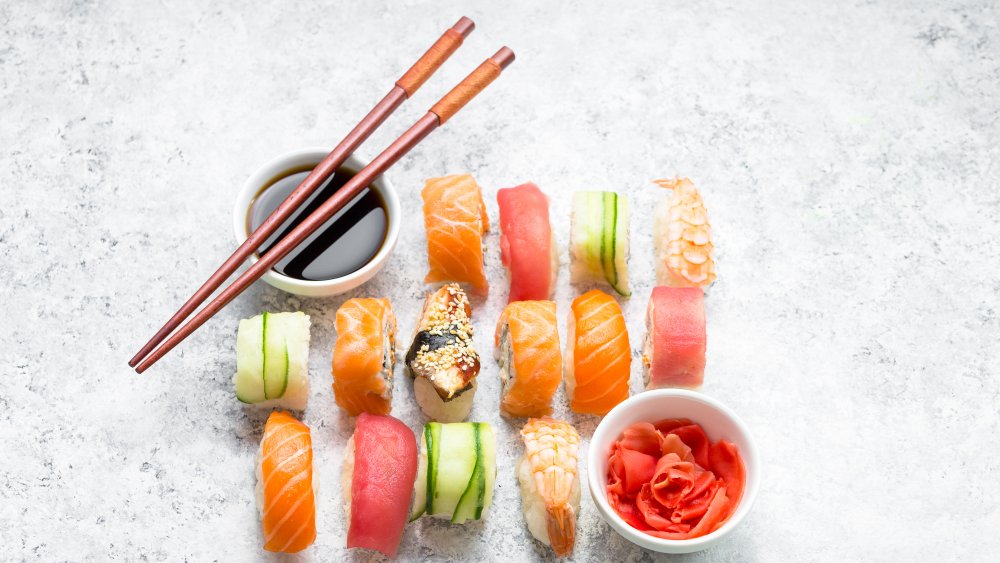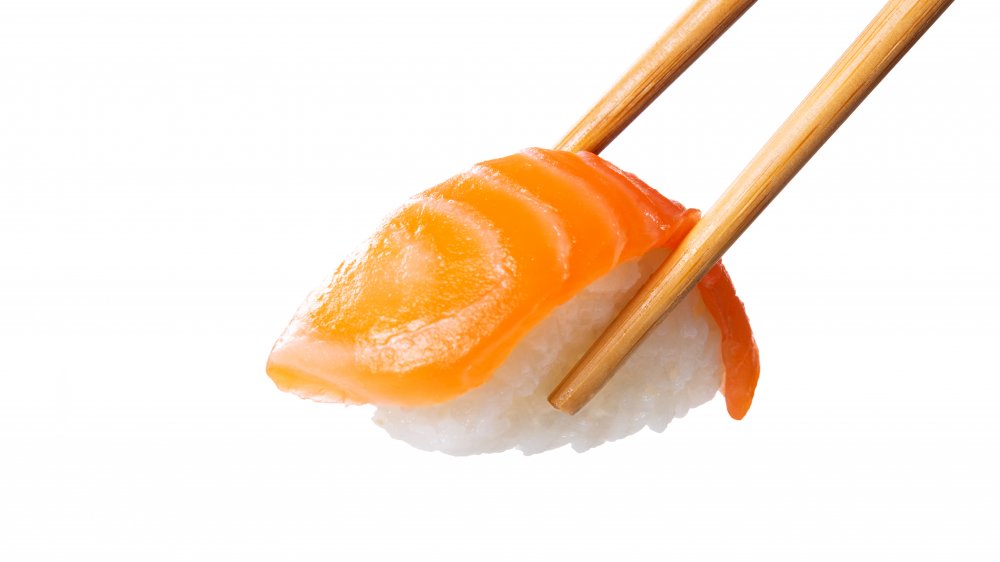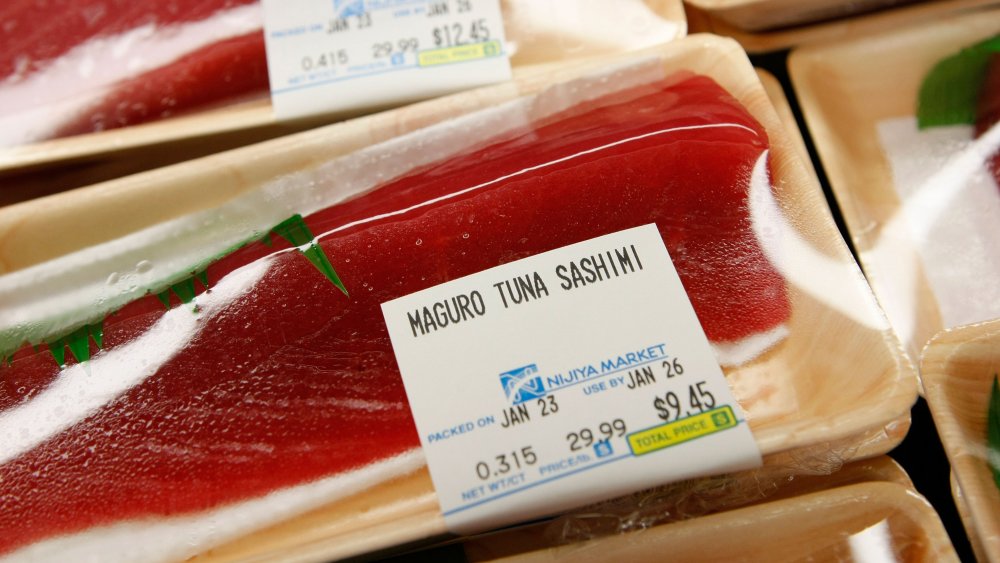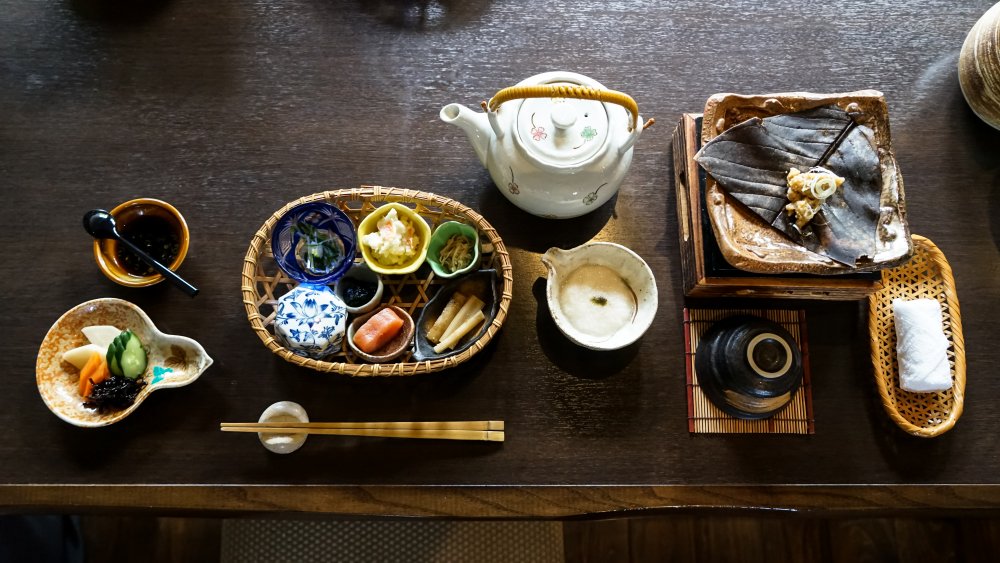When You Eat Sushi Every Day, This Is What Happens To Your Body
Some of us may not be too keen on a diet of raw fish and vinegared rice, but for others, it's a dream come true. And if we belong to a tribe of foodies who enjoy sushi several times a week (every day?) you'd be pleased to know that raw fish isn't just pleasing to the eye: Nutritionist Alix Woods notes that sushi has solid amounts of Omega-3 fish oils, which are essential to our body for their numerous health benefits (via The Resident). They can reduce cholesterol, mitigate the risk of heart disease, as well as reduce blood pressure, triglycerides, and help maintain your heart rhythm. What's more, fish is a perfect meal to choose after a work out. That's because it's loaded with protein, which can help support healing and recovery, explains Cynthia Sass, a contributing nutrition editor for Health.
So, what else happens to your body if you're a daily sushi lover? There are some important things you should know.
Sushi carries hidden health risks
While raw fish may be delicious, it can also harbor some nasty secrets. We won't go into too much detail, but let's just say a man with a daily sushi habit found himself having to deal with an uninvited pest that eventually sent him to the hospital to seek out medical treatment (via SF Gate). Back in 2017, the CDC warned that a growing appetite for sushi has also triggered a rise in cases involving Diphyllobothriasis (or fish tapeworm infection), symptoms of which include diarrhea, fatigue, stomach cramps, weakness, and unintended weight loss (via Healthline).
Raw fish isn't just a parasitic Trojan horse. According to a study reported by Vice, both salmonella (found in 1.6 percent) and listeria (found in 1.2 percent) were uncovered when tests were carried out on 250 sushi samples. We're not saying that you will get sick whenever you eat sushi — but the chances of coming down with something only increase when you eat sushi every day.
Too much raw fish can be toxic
Even if you and your sushi supplier are dead certain that your fish is fresh and safe, there is one more thing you need to worry about when you eat sushi every day: Exposure to high amounts of mercury, which has the ability to damage the central nervous system. "Mercury, in the form of methylmercury, is very sticky. Once you consume it in your food it tends to stay in the body for a long time," Roxanne Karimi, a research scientist at Stony Brook University, tells Vice. "It builds up and that can happen all along the food chain. So the higher you go in the food chain, the higher the levels of mercury are."
Mercury can be found in fish like tuna, king mackerel, swordfish, shark, tilefish, and orange roughy. Mercury in high doses has been found to hurt the brain development in a baby or a young child; so if you are pregnant or breastfeeding, it is best to give sushi, not just every day but in general, a hard pass (via The Globe and Mail).
They don't eat sushi everyday in Japan
Sushi has plenty of health benefits, but it has plenty of drawbacks, too. And if you're wondering how the Japanese people safely eat sushi every day, the answer is, many of them don't. As Australian-Japanese nutrition coach and chef Yoshiko Takeuchi explains, sushi in Japan is not only consumed in fewer quantities, it is eaten in a different way (via tells SBS). "I also feel that people in Australia like to eat a lot more sushi than people in Japan do. And it's often eaten with mayonnaise or a sweet sauce. To me, that's a westernized version of sushi and not the way we would usually have it in Japan."
There's also the fact sushi rice isn't terribly healthy. "The fact is Japanese rice (that's used for sushi) has one of the highest sugar contents of all rice and is quite unhealthy when compared to other types, like basmati rice. But in Japan, we typically eat lots of little tiny dishes consisting of [some rice], a lot of seaweed and vegetables, and some meat but not a lot of it," she says.
In the end, it may be smart and do as the Japanese do: Abstain from eating sushi everyday, and save it as a more occasional treat.



